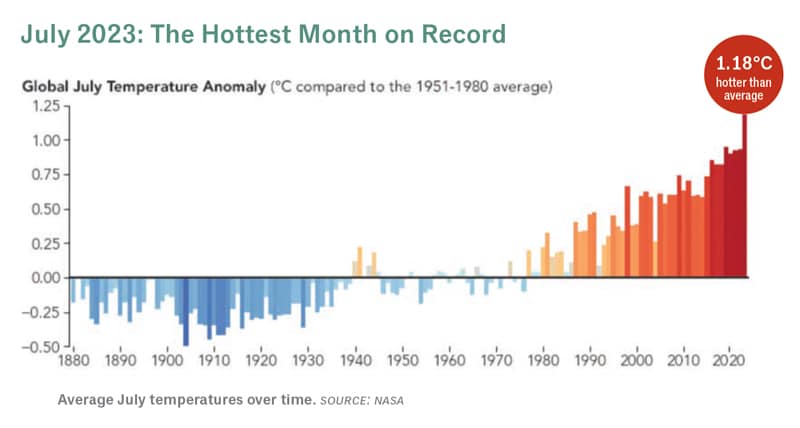Research shows that international students now actively evaluate institutions’ environmental records
- The college-aged cohort is also among the most likely demographics to experience climate-related anxiety and to engage with climate issues
- Recent research reveals that sustainability factors in study abroad decision making for four in ten international students
The following article is adapted from the 2024 edition of ICEF Insights magazine. The complete digital edition is freely available to download here.
2023 was a year in which more people, in more countries, have felt the harmful impacts of climate change. NASA research shows that July 2023 was the hottest month recorded since 1880. Around the world, humans and animals reeled from devastating floods, wildfires, droughts, storms, and intense heat waves.

More than half of youth have climate anxiety
People under the age of 30 are the most likely to consider global warming a matter of utmost urgency. Emma Lawrance, mental health innovations fellow at Imperial College London’s Institute of Global Health Innovation, notes, “Children born today will experience seven times the number of heat waves as their grandparents. At the same time, they are not yet in traditional positions of power to make the changes that are urgently needed to safeguard their future.”

Nudging students and staff along
The UN Environment Programme (UNEP) has a very helpful "Little Book of Green Nudges" to help students and staff on higher education campuses adopt sustainable behaviours.
The UNEP explains the concept like this:
“When a university provides easy bicycle parking and repair stations, it nudges students to bike to campus. When a university makes plant-based food the default dish, it nudges students towards environment-friendly diets. These ‘green nudges’ are positive and gentle persuasions to influence behaviours on campus and to instil environmental values that can last a lifetime.”
Examples of nudges include:
“Food: Using appealing descriptions for plant-based dishes, for example ‘spicy chickpea curry.’ A study in a university cafeteria found that describing vegetables in indulgent terms resulted in 25% more diners choosing them.
Recycling: Making recycling bins eye-catching and easy to use. One study found that bins with specialised lids increased the recycling rate for beverage containers by 34%.
Waste: In cafeterias, offering smaller plates and no trays, to discourage food waste.
Sharing: Setting up a system to share leftover food from meetings or events. A group of students at one university set up a food-sharing group that has prevented more than 7,000 kg of food from going to waste.”
A global survey conducted by Lancet of 10,000 youth aged 16–25 in 10 countries found that youth are experiencing significant levels of anxiety about climate change:
- 83% of respondents said people have failed to take care of the planet;
- 75% said the future is frightening;
- 59% were very or extremely worried and 84% were at least moderately worried;
- More than half reported feeling sad, anxious, angry, powerless, helpless, and guilty;
- More than 45% said their worry negatively affected their daily life and functioning.

Protests for change
Young people are clearly frustrated, and they are holding brands to account, including those in higher education. In 2019, the QS Environmental Concerns Survey found that 94% of students felt that universities could do more to reduce their environmental impact.
Last March, University of Toronto student protesters insisted that their university stop accepting research funding from fossil fuel companies. They were not the first in Canada to make such demands: in 2021, University of Victoria students and artist Emily Thiessen painted a 14-foot mural featuring salmon, a wind turbine, and words urging the new university president to divest from fossil fuels. Soon after, the university did just that, eliminating CDN$256 million in funding from fossil fuel businesses from the Working Capital Fund.
More broadly, in May 2023, students occupied schools and universities across Europe in climate protest, the latest wave of this type of mass protest.
Sustainable schools and universities have an edge
There’s no longer any doubt that educational brands gain a competitive edge when they commit to environmental sustainability. QS’s 2023 International Student Survey found that when considering study abroad, 4 in 10 international students “actively researched [a school’s] environmental sustainability strategy or efforts.”
In presenting the findings, QS insights manager Alex Berka reiterated the “active” part of the finding:
“This isn’t passive absorption of information or something they regard as a hygiene factor in their deliberations. It’s something they are really homing in on.”
Separately, Times Higher Education research has found that 82% of prospective international students say sustainability is an important factor in decision-making, and nearly 3 in 10 (27%) already use sustainability indicators to inform their study abroad decisions.

Measuring sustainability
QS, whose World University Rankings are closely read by students and institutions around the globe, also has an increasingly important sub-brand: the QS Sustainability Index. But QS isn’t the only organisation helping students and institutions to gauge campuses’ environmental commitment.
Other rankings include:
- The Association for the Advancement of Sustainability in Higher Education (AASHE) Sustainable Campus Index
- Times Higher Education Impact Rankings
- The UI Green Metric World University Ranking
A growing list of companies are devoted to helping higher education institutions to mitigate their climate impact. In Australia, for example, International Education Sustainability Group (IESG) launched its Climate Action Barometer for international education™ this summer to help institutions benchmark their environmental performance. So far, participating institutions include Charles Darwin University, Curtin University, University of Auckland, The University of Newcastle, The University of Sydney, University of Tasmania, Western Sydney University, and Flinders University.
Choosing hope over fear
Students want to play a significant role in the health and future of our planet, and an expanding menu of institutions and programmes are in line with that goal.
Some of the most exciting higher education institutions in the world right now have green programming as a competitive advantage. At Wageningen University in the Netherlands, for example, all six bachelor’s and 37 post-graduate degree programmes revolve around the environment, agriculture, and sustainability. QS ranks Wageningen among the world’s top 200 universities.
What about jobs?
Sustainability-focused programmes should lead to post-graduation work opportunities. As much as students want to protect our planet, research shows that most put job outcomes first. There is a clear role for career services to reach out to green employers and for communications staff to convey the practical, as well as philosophical, benefits of sustainability-oriented programmes.
The World Economic Forum’s Future of Jobs Report 2023 found that “nearly a quarter of all jobs (23%) globally will change in the next five years,” and that “roles from renewable energy engineers, solar energy installation and systems engineers to sustainability specialists and environmental protection professionals will be in high demand.”
Opportunities everywhere
Green jobs can also be found in sectors seemingly unconnected to the environment. For example, Jack Reicherts, who recently graduated from the University of Illinois, Urbana-Champaign with a civil and environmental engineering degree, landed an incredible position as the first-ever sustainability adviser of a major entertainment company. He will work to reduce the impact that the company’s film production and travel has on the environment. He told The Nation in June 2023 that “one does not always need to have a direct match between their background expertise and the role in front of them; indeed, for [me], having expertise from a different industry was an asset … opportunities pop up in unexpected places.”
This suggests a clear role for career advisers to help graduating students who want their work to have a sustainable orientation to network, connect with alumni, and adopt a wide lens when searching for jobs.
If you’ve got it, flaunt it
Virtually all international students (98%) responding to the 2019 QS Environmental Concerns Survey agreed that universities should publicise their sustainability efforts on social media channels, on the institutional website, at student fairs and events, and in their brochures.
As we move through the decade, sustainability is taking its rightful place alongside graduate outcomes, value for money, rankings, and location as a top factor influencing where international students choose to study.
For additional background, please see:
- "Climate action barometer offers a new benchmarking tool for international education’s response to climate change"
- "Sustainability factors in the study abroad research for nearly half of prospective students"
- "Environmental sustainability as a competitive advantage in international student recruitment"
Most Recent
-
The surging demand for skills training in a rapidly changing global economy Read More
-
US issues corrected student visa data showing growth for 2024 while current trends point to an enrolment decline for 2025/26 Read More
-
Survey finds US institutions expanding agency engagement and focusing on new student markets Read More


















